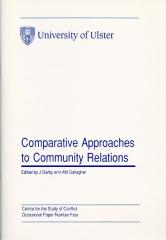Centre for the Study of Conflict
Comparative Approaches to Community Relations
Edited by John Darby and A. M. Gallagher
Copies are available in bookshops or, by post, from:Centre for the Study of Conflict University of Ulster COLERAINE Northern Ireland BT52 1SA
T: (01265) 324666 or 324165
Comparative Approaches to Community Relations Edited by John Darby and A. M. Gallagher
Centre for the Study of Conflict
The study of violent conflict is now an international subject since conflict itself is, increasingly, an international phenomenon. The end of the Cold War may have reduced the danger of large-scale global conflict but a great many ethnic conflicts, in Eastern Europe and elsewhere, have emerged - or re-emerged - as if to compensate and ensure that the total mass remains at least constant. The Centre for the Study of Conflict is particularly interested in ethnic conflict and has, over the last decade, completed a wide-ranging set of studies of the Irish conflict. The need to understand the extent to which this local conflict is distinctive. and the extent to which extrapolation to other conflicts is possible, have always been important additional dimensions to the Centre's work. The aim of this series of Occasional Papers, issued by the Centre for the Study of Conflict, is to address this central issue of comparability and transferability. It builds on the body of research carried out on the Northern Ireland conflict but is not a research series. Our main hope is that the series will broaden the context in which Irish conflict is considered, and will encourage comparative and innovative approaches to ethnic conflict in general.
Seamus Dunn, Director Return to publication contents
by John Darby, Ethnic Studies Network. The apparent revival of ethnic diversity and ethnic conflict throughout the world makes it increasingly difficult to regard ethnicity as a disease which contaminates a small number of unfortunate societies. Ten years ago the literature on ethnic conflict looked for its examples mainly to the western world -Canada, Belgium, the Basque areas, the consociational arrangements in Middle Europe and, of course, Northern Ireland. In 1991 the term is more likely to conjure up images of Eastern Europe, South East Asia, Africa and South America, as well as the resurgence of racism In Europe. Ethnic conflict is increasingly seen as a problem to be tackled rather than as a disease to be lamented. These changes are already reflected in the academic world. There is an increased willingness to approach conflict analysis and conflict resolution on a broader, comparative basis. So far, however, there has been little interest in comparative approaches to day-to-day management of conflict at policy level. It has been the Centre for the Study of Conflict's policy for some time to expand from an academic research base into policy concerns, and to encourage the study of these concerns on an international and comparative basis. The Ethnic Studies Network was launched in 1991 for this purpose. It was also the reason for the Centre initiating this series of Occasional Papers, and it is no coincidence that the first two published were respectively on the themes of comparative approaches to conflict analysis and on the relationship between research and policy. The papers in this collection were presented at a conference on comparative approaches to community relations held in the University of Ulster in 1990. Its main function was to explore the range of possibilities in the comparative approach to conflict studies and to community relations policy. The conference set out to encourage discussion between academics and officials involved in public policy. Attendance was confined to an invited audience of 50 people. We are grateful to the Central Community Relations Unit in Northern Ireland for both funding and participating in the conference. It is our belief that societies which are ethnically divided, and this includes most societies, have much to learn from each other in the management of diversity. For that reason the Centre has decided to publish the conference papers so that they may become available to as wide a readership as possible from both the academic world and the world of public affairs. Return to publication contents
| ||||||||||||||||||||
